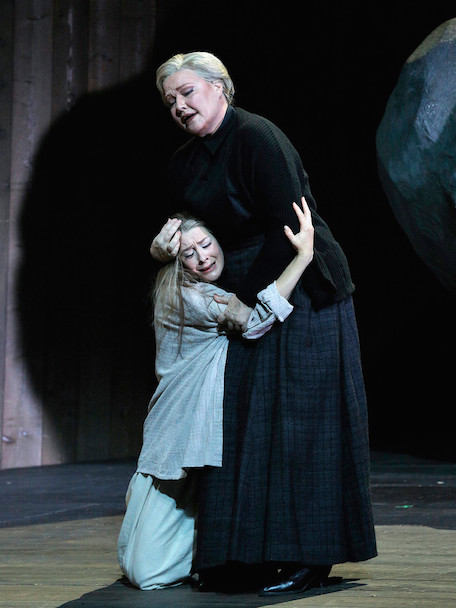
The passionate world of Jenůfa
It’s a rare but significant event when an audience goes completely quiet during a performance – no coughs, no rustling, no shifting in seats. Such was the audience during the second and third acts of the Sunday matinee performance of San Francisco Opera’s current production of Janáček’s Jenůfa.
Principal among the reasons for the audience’s rapt silence were the singers, especially the lead females. Jenůfa was sung by Swedish soprano Malin Byström, whose fine voice is rich and warm, with a trace of youthful sweetness. A lovely voice, truly. And ideal for the young village girl who falls in love with her cousin, a spoiled and narcissistic male who seems to have charmed the entire local female population, from his grandmother to the mayor’s daughter. Byström enacts the part with grace, blossoming from a dreamy girl to a woman beset by abandonment and false love to her final state as a woman who can recognize and accept a better and truer love.
Even more gripping in performance and in voice was the magnificent Karita Mattila, who sings the role of Jenůfa’s stern but ultimately compassionate stepmother, Kostelnička Buryjovka. Dynamically huge (even within the cavernous depths of the opera house) and laden with resonant nuance, Mattila’s voice is beyond exception. But even greater is her use of that instrument as a dramatic tool. It holds the moment, and grips the emotion, holding the listener enthralled. This was especially true in the second act when the character goes through several devastating moments, pleading with Števa, the wanton father of Jenůfa’s newly born child, not to abandon her stepdaughter and his child, and her final crushing decision to drown the newborn baby in the village’s frozen river while Jenůfa sleeps. Often sung by mezzos, the role requires real heft, something Mattila’s voice has in spades. There is also a kind of sexiness, for want of a better word, in the tone, which mixes well with the passionate quality of her dramatic performance.
No wonder the audience was captivated.
The lead male cast, the weak-willed rogue Števa, sung by Scott Quinn, and Laca, the man who truly loves Jenůfa, sung by William Burden, held their own in this opera of strong and avid women. Burden is especially transformed when in the last moments of the opera he faces Jenůfa with nothing but his character’s acceptance and love and his own excellent tenor voice.
It is, though, Janáček’s brilliant opera itself that gives these singers the story and the music necessary to allow their considerable talents to pour forth. Central to the opera is the stiflingly close context of a small village. Here, where the ability to read can be a life-changing event, everyone knows everything about everyone else. Bloodlines and shame rule, driving even the devout to terrible crimes. Finally, though Janáček presents us with the redemptive quality of love, which is capable of transcending physical weakness and psychic collapse.
All this is presented with a complex interweaving of words and music. The San Francisco Opera Orchestra was directed by Jiří Bělohlávek, the music director of Czech Philharmonic. And they were simply splendid. The score is filled with enticing percussion work, which lays down a throbbing rhythm in the opera’s overture like the beating heart of the infant who lies at the opera’s climactic tragedy, sparkling brass playing that signals the men’s personalities, good and bad, and exquisite strings that find their fulfillment in the accompaniment to Jenůfa’s second act prayer to the Virgin Mary for the protection of her child. The music weaves a continuous spell over the emotional life of the opera.
Jenůfa was the composer’s third opera and his first international hit. It features Janáček’s commitment to the folk music of his native land and his much admired study of what he termed speech melody – the speech patterns intrinsic to the everyday conversations of the Czech and Moravian people and the emotional implications of those speech melodies. His study of speech enabled Janáček to easily weave language into orchestral music.
The production designed by Frank Phillip Schlössmann in the 1990s still has impact. Comprised of wood plank walls that reach far into the heights of the stage and are arranged like the legs of a triangle pointing upstage to some far distant perspective, the sets have the claustrophobic quality of a Richard Serra sculpture, the blue sky offering a far distant and longed-for release. Enormous boulders dominate the stage, repeating the imagery used throughout the libretto, when the characters describe the intolerable burdens of the their lives.
– Jaime Robles
Jenůfa continues at the War Memorial Opera House through July 1. Information and tickets can be found at sfopera.com.
Photo: Malin Byström and Karita Mattila. Photo courtesy Cory Weaver/ San Francisco Opera.
